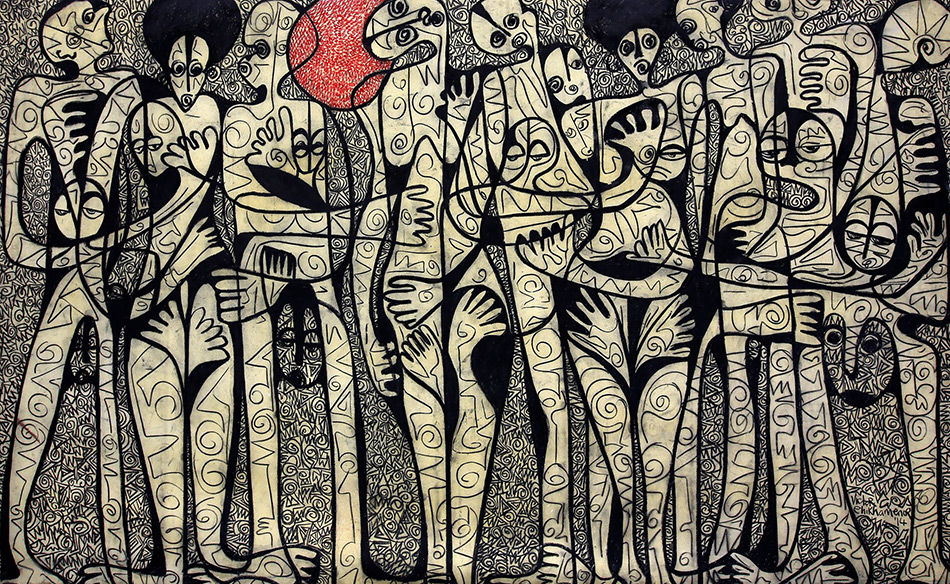by VIJAY PRASHAD

Victor Ehikhamenor (Nigeria), Lagos Hide and Seek, 2014.
Dear friends,
Greetings from the desk of Tricontinental: Institute for Social Research.
The Bulletin of the Atomic Scientists has now moved the Doomsday Clock to 90 seconds to midnight, the closest it has been to the symbolic time of the annihilation of humanity and the Earth since 1947. This is alarming, which is why leaders in the Global South have been making the case to halt the warmongering over Ukraine and against China. As Namibia’s Prime Minister Saara Kuugongelwa-Amadhila said, ‘We are promoting a peaceful resolution of that conflict so that the entire world and all the resources of the world can be focused on improving the conditions of people around the world instead of being spent on acquiring weapons, killing people, and actually creating hostilities’.
In line with the alarm from the Doomsday Clock and assertions from people such as Kuugongelwa-Amadhila, the rest of this newsletter features a new text called Eight Contradictions in the Imperialist ‘Rules-Based Order’ (which you can download as a PDF here). It was drafted by Kyeretwie Opoku (the convenor of the Socialist Movement of Ghana), Manuel Bertoldi (Patria Grande /Federación Rural para la producción y el arraigo), Deby Veneziale (senior fellow, Tricontinental: Institute for Social Research), and me, with inputs from senior political leaders and intellectuals from across the world. We are offering this text as an invitation to a dialogue. We hope that you will read, circulate, and discuss it.
We are now entering a qualitatively new phase of world history. Significant global changes have emerged in the years since the Great Financial Crisis of 2008. This can be seen in a new phase of imperialism and changes in the particularities of eight contradictions.
1. The contradiction between moribund imperialism and an emerging successful socialism led by China.
This contradiction has intensified because of the peaceful rise of socialism with Chinese characteristics. For the first time in 500 years, the Atlantic imperialist powers are confronted by a large, non-white economic power that can compete with them. This became clear in 2013 when China’s GDP in purchasing power parity (PPP) overtook that of the United States. China accomplished this in a much shorter period than the West, with a significantly larger population and without colonies, enslaving others, or military conquest. Whilst China stands for peaceful relations, the US has become increasingly bellicose.
The US has led the imperialist camp since World War II. Post-Angela Merkel and with the advent of the Ukraine military operation, the US strategically subordinated dominant sections of the European and Japanese bourgeoisie. This has resulted in weakening intra-imperialist contradictions. The US first permitted and then demanded that both Japan (the third-largest economy in the world) and Germany (the fourth-largest economy) – two fascist powers during World War II – greatly increase their military expenditure. The result has been the ending of Europe’s economic relationship with Russia, damage to the European economy, and economic and political benefits for the US. Despite the capitulation of most of Europe’s political elite to full US subordination, some large sections of German capital are heavily dependent on trade with China, much more than on their US counterparts. The US, however, is now pressuring Europe to downgrade its ties to China.
More importantly, China and the socialist camp now face an even more dangerous entity: the consolidated structure of the Triad (the United States, Europe, and Japan). The US’s growing internal social decay should not mask the near absolute unity of its political elite on foreign policy. We are witnessing the bourgeoisie placing its political and military interests over its short-term economic interests.
The centre of the world economy is shifting, with Russia and the Global South (including China) now accounting for 65% of the world’s GDP (measured in PPP). From 1950 until the present, the US share of the global GDP (in PPP) has fallen from 27% to 15%. The growth of the US’s GDP has also been declining for more than five decades and has now fallen to only around 2% per year. It has no large new markets in which to expand. The West suffers from an ongoing general crisis of capitalism as well as the consequences of the long-term tendency of the rate of profit to decline.

2. The contradiction between the ruling classes of the narrow band of imperialist G7 countries and the political and economic elite of capitalist countries in the Global South.
This relationship has undergone a major change from the heydays of the 1990s and the height of US unilateral power and arrogance. Today, there are growing cracks in the alliance between the G7 and Global South power elites. Mukesh Ambani and Gautam Adani, India’s largest billionaires, need oil and coal from Russia. The far-right Modi-led government represents India’s monopoly bourgeoisie. Thus, the Indian foreign minister now makes occasional statements against US hegemony in finance, sanctions, and other areas. The West does not have the economic and political ability to always provide what power elites in India, Saudi Arabia, and Turkey need. This contradiction, however, has not sharpened to the degree that it can be a focal point of other contradictions, unlike the contradiction between socialist China and the US-led G7 bloc.
TriContinental for more
